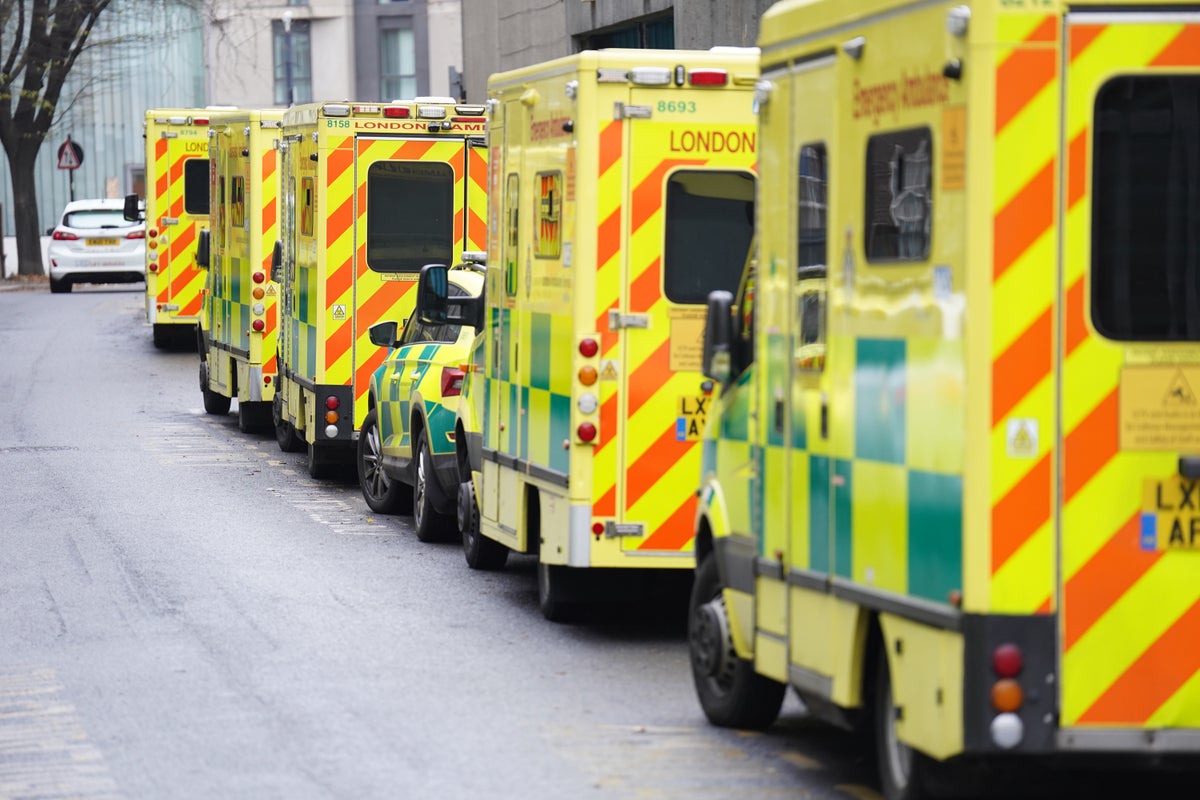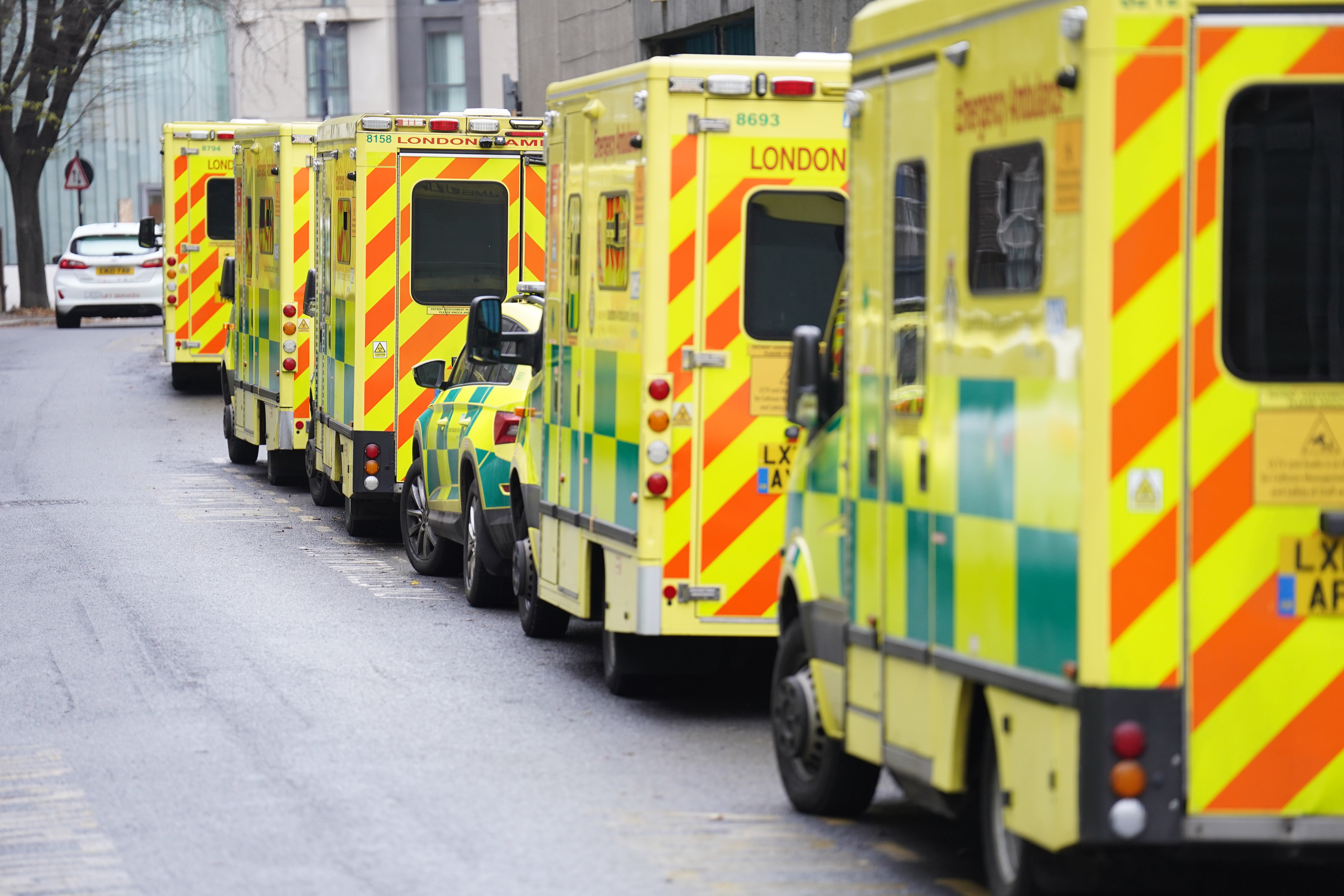
A record number of ambulances were delayed outside A&E departments over the Christmas period as the NHS grapples with one of the most difficult periods in its history.
Official figures published by the NHS on Friday showed that more than a quarter of patients (26 per cent) waited an hour to be transferred from ambulance to hospital ward.
Four in 10 (44 per cent), meanwhile, waited for at least 30 minutes.
This compares with 10 per cent waiting over an hour at this point last year while 23 per cent waited at least half an hour.
The figures, covering the week up to New Year’s Day, highlight the scale of the challenge facing the NHS and staff working in hospitals across the country.
Medics say the health service is in the teeth of its biggest-ever “crisis”, with pre-existing backlogs in services exacerbated by the Covid pandemic.
NHS services have also been hit by a series of strikes by workers in a row over pay and conditions.
Cases of Covid and the flu are also rising amid the colder winter months.
According to NHS data, an average of 5,105 flu patients were in general hospital beds last week, up 47 per cent on the previous week and nearly seven times the number at the start of December.
Patients in critical care beds have also jumped sharply, up 26 per cent week-on-week from 267 to 336.
At this stage last winter, just 38 patients were in hospital with flu and only two in critical care.
An average of 12,809 beds a day last week were filled with patients ready to leave, up almost a third on the figure for this time last year (9,858).
Rishi Sunak, the prime minister, continues to blame the Covid pandemic for the current problems in the NHS.
On Friday he acknowledged that the health service was under “enormous pressure” and repeated his commitment to tackling waiting lists - outlined in his first major speech of the year days earlier.

Mr Sunak said “billions” more had been invested in the NHS and social care since he became prime minister.
"The NHS is obviously under enormous pressure as we recover from Covid and I have enormous admiration for all the people working incredibly hard in the NHS right now to help get us through that,” he told reporters on a visit to a London school on Friday morning.
"We are supporting them with billions of pounds of extra funding but in particular this winter what we want to do is make sure we move people out of hospitals into social care, into communities - that is one of the most powerful ways we can ease some of the pressures on A&E departments and ambulances that are waiting too long."
According to Labour Party analysis of NHS data, some five million people were unable to book a GP appointment in October.
Some patients decide to go to A&E whenever they can’t see a doctor, which contributes to backlogs on wards.
Separate figures published by the NHS in October showed that some 180,000 people in England waited three months or longer for key diagnostic tests.
Keir Starmer, the Labour Party leader, set out plans for the NHS in his own speech on Thursday.
He claims the party has a “fully costed plan for the biggest NHS training programme in its history”.
“We’ll tackle the capacity crisis with more doctors, more nurses, more health visitors,” he added. And we’ll broker a fair pay agreement that will transform the pay and conditions for every carer in the country.”
Steve Barclay, the health secretary, was tackled about the current state NHS this morning while on a visit to a hospital in Watford, London.
He dodged a question about how safe the NHS currently is for patients, citing the impact of the Covid pandemic, as well as surging flu cases.
When asked if it was disingenuous to blame Covid-19 and flu, when issues with social care had been left unaddressed by successive governments, Mr Barclay said: "I have prioritised focusing on the integration between health and social care, and so has the prime minister and the chancellor."
He pointed to funding announced in the autumn statement, adding: "At a time when the Treasury is under very significant pressure because of the cost of the pandemic, the cost of the war in Europe, the impact that has on the cost of living, on energy prices, the chancellor has prioritised the NHS and social care."
NHS national medical director for England, Professor Sir Stephen Powis, said: "We knew this winter would be one of the most difficult in the history of the NHS and I want to thank staff for all their hard work in caring for and treating so many patients while dealing with record demand on services, including the enormous pressure from flu and Covid.
"The plans we announced last autumn will help ensure we are in the best place possible to provide care for patients at this incredibly challenging time, with extra call handlers in place, community services established to help keep people out of hospital where possible, and we’re also continuing to make good progress to put the equivalent of 7,000 extra beds in place by March."

.png?w=600)





